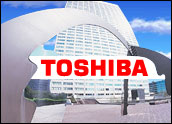
A new lithium-ion battery from Toshiba may hold promise for the future of electric vehicles. The electronics giant yesterday unveiled a battery that takes only a minute to recharge to 80 percent of its full strength, making it by far the fastest recharging lithium-ion battery available.
The battery fully charges in less than 10 minutes. The prototype uses nano-materials technology to allow for faster charging without the inherent problems of charging with larger lithium particles.
Traffic Jam
If a lithium-ion battery is charged too quickly, it creates a bottleneck in which the lithium moving through electrolyte liquid from the negative electrode to the positive backs up on the surface of the liquid. Under slower charging, the lithium “hides” in void space and does not cause a problem.
“Liquid electrolyte is unstable in the presence of metallic lithium and will cause all sorts of problems. That is why it is imperative to observe the slow-charging rate rule with lithium-ion batteries,” Donald Sadoway, MIT professor of materials chemistry and an electrochemistry researcher, explained to TechNewsWorld. Sadoway said the consequences could be as severe as the battery exploding.
By using nano-material, Toshiba has increased the surface area of the lithium and widened the bottleneck, allowing the particles to pass through the liquid and, thus, recharge the battery, more quickly.
“In the long run, if this is truly scalable, this could mean the difference between an electric vehicle future or not,” Sadoway said.
On the Market in ’06
Toshiba said the battery, which is 3.8 mm thick, 62 mm high and 35 mm deep,would be available in 2006 for industrial and automotive uses, such as storing the energy produced by trains and cars — which is now wasted.
Toshiba is also touting the prototype’s long life. It said it tested a new battery by discharging and fully recharging 1,000 times at 77 degrees and found that it lost only 1 percent of its capacity.
The battery also held its capacity well in temperature extremes. Toshiba said its tests found that it gives out 80 percent of its power capacity at minus 40 degrees and 95 percent when tested at temperatures as high as 113 degrees after 1,000 charge and discharge cycles.





















































